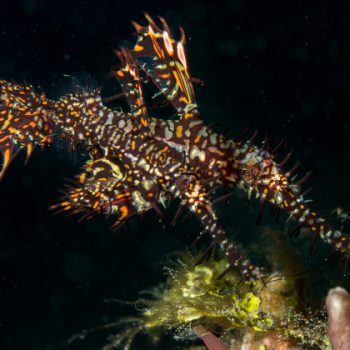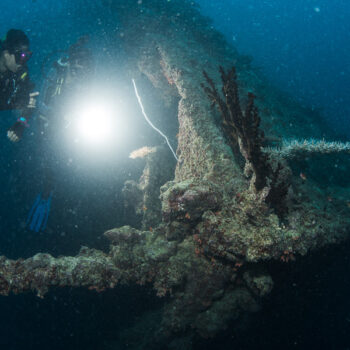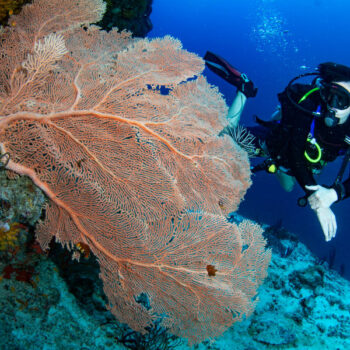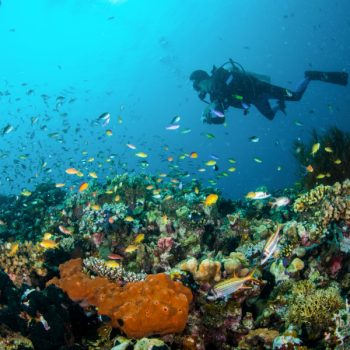IDR 1.050.000
Not dived in a while? ReActivate your skills with a Scuba Skills Update course. With this refresher course, we will get you back in the water and diving with ease in no time.
Refresh and ReActivate your diving abilities with Divine Divers on Gili Meno. This program is a scuba refresher course and a safe and fun way to practice dive skills with a dive professional. It is a quick and easy re-introduction to diving for certified divers after about one year of inactivity.
Please note, if you have not dived in longer than a year and you have less than 30 dives refresher training is mandatory.
The Refresh program is the perfect way to update both your practical and theoretical diving knowledge before jumping back into the water. This is for your own comfort and security.
Your instructor will first cover the most important aspects of dive theory. After that we will take you into the swimming pool and make sure you are safe and sound. After that, a fun dive on one of our beautiful dive sites around the Gili Islands awaits.
The course schedule is flexible and we can conduct the course in half a day and of course adapt it to your holiday schedule. In general, please expect the 3 to 4 hours of your refresher training look like this:
Day 1 (08:30 – 13:00)
Our courses are conducted in accordance with PADI standards. The diving agency actually doesn’t play a significant role in the refresher training since it is not a certification program. Therfore you can take part in the refresher course no matter what you main diving agency is. In case you are interested, you will also find the difference between PADI and SSI in the FAQ’s.
Once you have gotten your hair wet again it would be a shame to not do a few more dives. Consider doing a few more fun dives or even continue your dive training.
Advanced Open Water Diver Course
and many, many more 🙂
Please note, the waters around the Gili Islands have been declared a Marine Park. Therefore a one time Marine Park fee of 100.000 IDR has to be paid by all diving and snorkel tour participants. This fee is NOT included in our prices and has to be paid in cash at our dive center on Gili Meno.
If booked in advance with a 50% deposit paid the Refresher Course comes to a price of 997.500 IDR. If you would like to take advantage of this pre-booking discount please contact us directly per email. Please note, the deposit needs to arrive on our bank account before you arrive on the island, otherwise it is not a pre-booking discount. LOL
Plans change. We know that too. Our cancellation policy is flexible and we are trying our best to meet your holiday schedule and potential interruptions of it. If you book a course in advance but you are then unable to do it because you get sick, we will reimburse you of course minus the transaction costs.
When you received your latest and greatest certification card, you were certified for life. In theory you could just go to a dive center, rent some tanks and go on a shore dive. This not possible on the Gili Islands but it is in many other places of the world. Do you think this is a smart idea? If you have been away from diving a long time long, your skills will have gotten rusty and it might be the best course of action to do a refresher. According to some dive organizations any diver who has not dived in six months needs to take a ReActivate (PADI) or Scuba Skills Update (SSI) course.
We at Divine Divers believe that those statements are a little too broad. Take two potential divers. First, there is a master diver with twenty years of experience who has not been able to dive for a year because of business and family commitments. He is less likely to need a reactivation when compared to an Open Water Diver with no dives after training who has not been diving in five months. Obviously, the need for training depends on many factors, not just time. Some dive centres act as if the guidelines are law and will not allow divers who have not dived in six months to join them until they take the course.
This is not the case at Divine Divers Gili Meno. We will first look at your dive experience, your comfort level and the time out of water. As a general guideline, if you have not dived in longer than a year and you have less than 30 dives refresher training is mandatory with us.
It has been a while since your last live and you are looking to head off on holiday. You have also decided that you’d like to tune up your scuba skills. Now there are several options how you can do this.
You can either approach a local dive center in your home country or do the refresher in those waters where you are planning on diving. Both has its advantages and disadvantages. A recap of the theory and the pool training can surely be done everywhere in this world. But before you get yourself into a dry suit and jump into the northern sea in Holland, you might be better off and consider doing the refresher with us in the tropical waters of the Gili Islands (unless you really like drysuit diving).
There are some serious conditions such as epilepsy, active asthma, emphysema, heart disease or haemophilia that could prohibit any diving activity. Please refer to attached medical questionnaire to check if you are not sure: Diver-Medical-Questionnaire
If you answer any of the questions with “yes” on page number 1, then please check the related box on page number 2. If you have to put another yes there, then you need to see a doctor to get a fit for diving certificate. There are also doctors on the Gili Islands that can examine you and issue this certificate, so don’t worry if you didn’t check the medical form beforehand.
You are already a diver. So it is highly likely that you’ve probably come across PADI and SSI, the two major training agencies in the world. But is there a big difference or is one better than the other?
Instructors of both agencies will teach you how to be a skilled diver, as there is a certain skill set that every diver needs to have. Therefore, all diving agencies follow a legal framework laid down by the World Recreational Scuba Diving Council. The training agencies also accept each other; hence you could do an Open Water Course with the one and an Advanced Course with the other agency.
The main difference is in the theoretical education, requirements and certification costs. And of course, much comes down to personal preferences and other factors such as the teaching skills of your instructor and the conditions of the water.
We have decided to offer PADI courses even though most of our instructors can teach both PADI and SSI.
For the Refresh course the teaching organisation does not play a role because there is no certification involved. The main difference is the name of the program: ReActivate (PADI) versus Scuba Skills Update (SSI).
Postcard-like white sandy beaches, azure and year-round warm waters (28 to 29 degrees), the reef on your doorstep and a great lifestyle. There are also no motorized vehicles, traffic jam or pollution. The Gilis are a one and half hour boat ride from Bali and super easy to reach. Does this sound like paradise to you? To us the Islands are an image of Shangri La.
But that’s not it – the Gilis are known as the turtle capital in the world. Rightfully so, because both green and hawksbill turtles are abundant. Reef sharks are also frequently spotted and there is a broad range of marine life to be met on all dives. The dive sites are rarely more than a 15-minute boat ride away and diving is great all year round.
The dry season is running from May to October and the rainy season from November to April. Rainy season sounds more extreme than it actually is because it hardly ever rains an entire day – expect showers at different severity but therefore less people.
We love what we do and we do it well! We have been in the game for over 10 years as Divine Divers on Gili Meno but our love for diving didn’t start here.
Divine Divers has a relaxed yet professional atmosphere and is located in a superb spot on Meno island: sunset beach. You can end your diving day with your feet in the sand, a cold drink in your hand and watch the sun set over Bali’s mighty volcano.
Apart from that our diving groups are small and our divemasters and instructors hand chosen for their personality and excellent guiding and teaching records. Our guides take a maximum of four guests of the same experience level into their groups. You will have a lot of choices per day to join a dive because our boats go out three times: at 09:00, 11:00 and 14:00.
Furthermore, safety is our primary concern; our equipment is in excellent order and of course regularly maintained. We are committed to offering first-class service and high quality dive courses.



